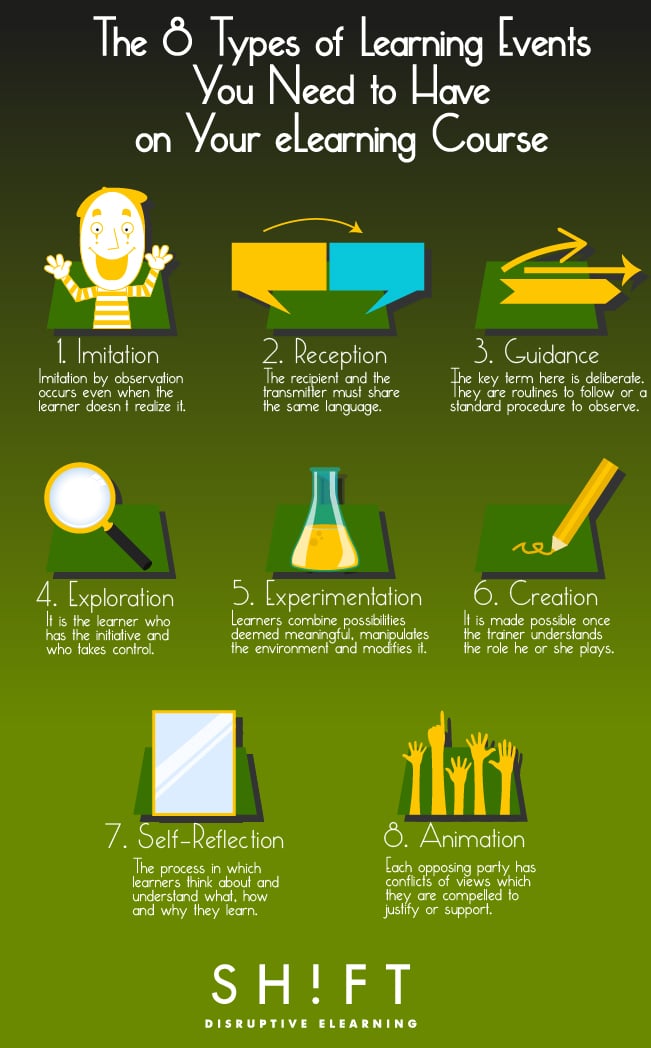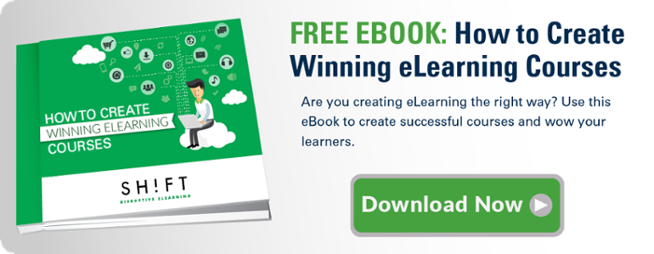A good eLearning course requires the right combination of learning events. But what are these exactly? A learning event is a simplified description of the student's learning activity. There's an infinite number of learning strategies, but only eight learning events. It isn’t necessary to use all the events in the creation of your course. Just get acquainted with each of them to make sure you use the right combination to make your course effective.
LeClercq and Poumay's (2005) Eight Learning Events Model propose a ‘palette’ of 8 specific ways, referred to as Learning Events, that the eLearning designer can use to describe any point in the development of learning activities.

1. Imitation
It's not just children who learn by mimicry. All of us humans, in fact, learn a lot simply by observing and imitating or, if you insist, by doing. The process is either voluntary or not. As a form of latent learning, imitation by observation occurs even when the learner doesn't realize it. What's more, it can happen without any communication code and thus exists before language.
There are many examples of learning from observation and imitation, the most popular of which includes role-playing, modeling or simulation and practicals. For instance, your eLearning course can walk students through the basics of building a product with the help of demonstration videos.
2. Reception
We learn a lot from the messages we receive. We learn when knowledge is transmitted or passed on from instructor to students, student to another student, or even from student to instructor. Unlike imitation by observation, this communication process is made possible by language. The recipient and the transmitter must share the same language. The message can be transmitted either by writing or oral communication, direct or indirect.
Examples of this learning event abound. Take, for instance, the reception of content through text and audio or recordings.
3. Guidance
An effective eLearning course encourages the learner to act. Likewise, a good instructor guides students to nourish their interest, maintain their motivation, correct them and make sure they properly apply their lessons.
In this kind of learning event, unlike the previous two (imitation and reception), action is necessary. In it, students learn not only by imitating but deliberately practicing. The key term here is deliberate. They are routines to follow or a standard procedure to observe. An example of this is when the eLearning course includes drills, application tasks, exams, quizzes and exercises to assess student performance.
4. Exploration
This is probably where the most learning takes place. Learners who explore questions to solve problems or answer questions start by determining their own learning process. Propelled by curiosity, learners take advantage of whatever resources they can get—from the course, instructors, peers and even outside the course.
While this process is unpredictable and highly individual or learner-centered, exploration remains an extremely fruitful learning event. In it, it is the learner who has the initiative and who takes control. The role of the trainer, then, is to help the learner locate resources such as books, social media tools and like-minded peers.
5. Experimentation
This learning event is all about letting students experiment on their own terms. It often starts with the tendency to see “what will happen” during or after the experiment. And it often occurs in contexts or environments conducive to experimentation: case studies, simulations and scenarios. The learner exhausts and combines possibilities he or she deems meaningful, manipulates the environment and modifies it if necessary.
As in exploration, the trainer or instructor also has a role to play in the event of experimentation. He or she has to provide an “experimentable” context or environment, one which the student can respond and relate to.
6. Creation
We learn whenever we create something new or produce something concrete. It can be anything, from adapting a story into a stage play or building basic web pages following a demonstration video.
While encouraging students to create is hard, this learning event is made possible once the trainer or instructor understands the role he or she plays. Not only is the instructor a facilitator, he or she has to provide both material and moral support to encourage the act of creation. Making sure students learn to do something new, not just know something new is the main goal in eLearning development.
7. Self-Reflection
This is simply a process in which learners think about and understand what, how and why they learn. In self-reflection, they strengthen their capacity to evaluate their own learning and thus make better decisions. We should remember to emphasize the broader context at the end of the learning experience.
As in previous learning events, the instructor has to fulfill a crucial role during the student's self-reflection process. He or she can give some helpful hints or advice, inspire confidence, or help the learner assess the situation. He must reiterate the importance of the newly acquired knowledge in a real-world context. They should provide emotional closure as well as constant support.
8. Debate or Animation
The key phrase here is “to animate” or liven up the learning journey through collaborative activities, challenging discussions or debates, and social interactions. This event takes place between students or between students and instructor. Each opposing party has conflicts of views which they are compelled to justify or support.
When animating the learning process, trainers can fill a less invasive role (such as mere observation during the debate) or a more invasive one (such as moderating the debate or participating to it).




